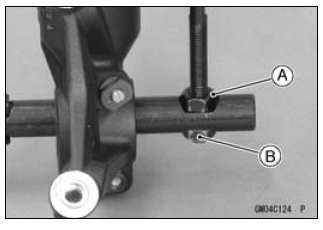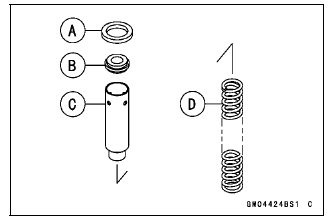 Kawasaki Z1000SX - Service manual > Front Fork Removal (Each Fork Leg)
Kawasaki Z1000SX - Service manual > Front Fork Removal (Each Fork Leg)
- Remove:
Upper Fairing (see Upper Fairing Removal in the Frame chapter)
Front Wheel (see Front Wheel Removal in the Wheels/Tires chapter) - Remove the handle bar holder bolt [A].
- Loosen the upper front fork clamp bolts [B] and lower front clamp bolts [C].

- If fork leg is to be disassembled, loosen the upper and lower front fork
clamp bolts to lower the fork leg [A] as shown. And retighten the lower
front fork clamp bolts.
Then, loosen the top plug beforhand.

NOTE
- Loosen the top plug after loosening the upper front fork clamp bolt.
- Loosen the lower front fork clamp bolts.
- With a twisting motion, work the fork leg down and out.
Front Fork Installation
- Install the fork so that the top end [A] of the outer tube as shown in
the figure.
28 mm (1.10 in.) [B] - Tighten:
Torque -
Lower Front Fork Clamp Bolts : 25 N*m (2.5 kgf*m, 18 ft*lb)
Front Fork Top Plugs: 34 N*m (3.5 kgf*m, 25 ft*lb)
Upper Front Fork Clamp Bolts: 20 N*m (2.0 kgf*m, 15 ft*lb)

NOTE
- Tighten the top plug before tightening the upper front fork clamp bolt.
- Tighten the two clamp bolts (lower) alternately two times to ensure even tightening torque.
- Install the removed parts (see appropriate chapters).
- Adjust:
Spring Preload (see Spring Preload Adjustment)
Rebound Damping Force (see Rebound Damping Force Adjustment)
Compression Damping Force (see Compression Damping Force Adjustment)
Fork Oil Change
- Remove the front fork (see Front Fork Removal).
- Hold the inner tube lower end in a vice.
- Unscrew the top plug [A] out of the outer tube.

- Holding the top plug [A] with a wrench [B], tighten the spring preload adjuster [C].
NOTE
- After tightening, lift the top plug to make the space.
- Slide down the damper [D].

- Install the clamps [A] as shown in the figure.
NOTE
- Set the cutout [B] of the clamp to the groove [C] of collar [D], pull up the outer tube [E] to hold it by the clamps, and then tighten the two bolts [F]. The outer tube is used as a guide.
Special Tools -
Fork Spring Compressor: 57001-1587
Clamp : 57001-1693


- Insert the holder bar [A] into the axle hole of the front fork [B].
Special Tool - Bar: 57001-1751 (For Left Fork Leg)
- Position the bar left and right and evenly.

- Insert the compression shaft and install the nut.
- Insert the lower end of the compression shaft [A] into the hole [B] of the holder bar.

- Screw the adjust nut [A] onto the compression shaft as shown in the figure.
- Screw the locknut [B].
- Set the other side compression shaft same process.

- Set the holder bar [A] and compression shafts [B].

- Screw in the nuts [A] until the piston rod nut comes out.

- While holding up the top plug [A], insert the fork spring stopper [B]
between the piston rod nut [C] and the slider.
Special Tool - Fork Spring Stopper: 57001-1374

- Holding the spring preload adjuster [A] with a wrench [B], loosen the piston rod nut [C].

- Remove:
Top Plug with the Rebound Damping Adjuster Rod
Damper [A]
Slider [B]
Collar [C]
Fork Spring [D]

- Drain the fork oil into a suitable container.
- Pump the piston rod [A] up and down at least ten times to expel the oil from the fork.
Special Tool - Fork Piston Rod Puller, M12 × 1.25 [B]: 57001-1289

- Hold the fork tube upright, press the outer tube [A] and the piston rod all the way down.
- Pour in the type and amount of fork oil specified.
Fork Oil
Recommended Oli:
SHOWA SS-47 or equivalent
Amount (Per Side):
When changing oil:
Approx. 420 mL (14.2 US oz.)
After disassembly and completely dry:
492 +-2.5 mL (16.6 +-0.085 US oz.)

If necessary, measure the oil level as follows.
- Hold the inner tube vertically in a vise.
- Using the piston rod puller [A], move the piston rod [B] up and down more than ten times in order to expel all the air from the fork oil.
Special Tool - Fork Piston Rod Puller, M12 × 1.25 [A]: 57001-1289

- Remove the piston rod puller.
- Wait until the oil level settles.
- With the fork fully compressed and the piston rod fully pushed in, insert a tape measure or rod into the inner tube, and measure the distance from the top of the outer tube to the oil.
Oil Level (fully compressed, without spring)
Standard:
91 +-2 mm (3.58 +-0.08 in.) (from the top of the outer tube)
NOTE
- Fork oil level may also be measured using the fork oil level gauge.
Special Tool - Fork Oil Level Gauge [A]: 57001-1290

- With the fork fully compressed and without fork spring, insert the gauge tube into the inner tube [B] and position the stopper across the top end [C] of the outer tube [D].
- Set the gauge stopper [E] so that its lower side shows the oil level distance specified [F].
- Pull the handle slowly to pump out the excess oil until the oil no longer comes out.
If no oil is pumped out, there is insufficient oil in the inner tube. Pour in enough oil, then pump out the excess oil as shown above.
- Screw on the rod nut [A] fully to the piston rod [B].

- Screw the fork piston rod puller onto the end of the piston rod.
Special Tool - Fork Piston Rod Puller, M12 × 1.25: 57001 -1289
- Pull the puller up above the outer tube top.
- Install the fork spring [A] with the smaller end [B] facing upward.

- Install:
Collar [A]
Damper [B]
Slider [C]

- Check the distance between the upper end [A] of the spring preload
adjuster [B] and rebound damping adjuster [C] with a pair of vernier
caliper.
1.5 mm (0.059 in.) [D]

- Set the fork spring compressor on the slider [A] using the outer tube as
a guide.
Special Tools -
Fork Spring Compressor: 57001-1587
Clamp: 57001-1693
NOTE
- Set the cutout of the clamp to the slider.

- While holding up the piston rod puller, insert the fork spring stopper
between the piston rod nut and the slider.
Special Tool - Fork Spring Stopper: 57001-1374
- Remove the piston rod puller. -Insert the rebound damping adjuster rod into the holes of the piston rod.
- Screw in the top plug until it stops onto the piston rod.
- Check the O-ring [A] on the top plug and replace top plug with a new one
if damaged.
- Apply grease to the new O-ring.
- Holding the spring preload adjuster [B] with a wrench [C], tighten the
piston rod nut [D] against the top plug.
Torque - Piston Rod Nuts: 20 N*m (2.0 kgf*m, 15 ft*lb)

- While holding up the top plug [A], pull out the fork spring stopper [B].
- Remove the fork spring compressor.
- Raise the outer tube and screw the top plug into it.
- Install the front fork (see Front Fork Installation).
- Adjust the spring preload (see Spring Preload Adjustment)

Front Fork Disassembly
- Remove the front fork (see Front Fork Removal).
- Drain the fork oil (see Fork Oil Change).
- Install the suitable pipe (
 26
-
26
-  32) [A] into
the cylinder unit.
32) [A] into
the cylinder unit. - Set the fork leg inverted.
- While pushing down [B] the fork leg, loosen the bottom Allen bolt.
- Remove the Allen bolt and gasket.

- Take the cylinder unit [A] and center ring plate [B] out of the inner
tube.
- Do not disassemble the cylinder unit.

- Separate the inner tube from the outer tube as follows.
- Slide up the dust seal [A].
- Remove the retaining ring [B] from the outer tube.

- Holding the outer tube [A] by hand, pull the inner tube [B] several times to pull out the outer tube.

- Remove the inner tube guide bushing [A], outer tube guide bushing [B], washer [C], oil seal [D] from the inner tube.

See also:
 Kawasaki Z1000SX - Service manual > Rebound Damping Force Adjustment
Kawasaki Z1000SX - Service manual > Rebound Damping Force Adjustment
To adjust the rebound damping force, turn the rebound damping adjuster [A] until you feel a click. The standard adjuster setting is the 2 turns out from the fully clockwise position.
 Kawasaki Z1000SX - Service manual > Front Fork Assembly
Kawasaki Z1000SX - Service manual > Front Fork Assembly
Replace the following parts with new one. Oil Seal [A] Outer Tube Guide Bushing [B] Inner Tube Guide Bushing [C] Dust Seal [D] Retaining Ring [E] Bottom Allen Bolt Gasket Install the following parts onto the inner tube. Dust Seal Retaining Ring Oil Seal Washer [F] Outer Tube Guide Bushing Inner Tube Guide Bushing Insert the inner tube to the outer tube. Fit the new outer tube guide bushing [A] into the outer tube.
 Rider's Manual BMW R 1250 GS GSA
Rider's Manual BMW R 1250 GS GSA Owner's Manual Harley-Davidson Sportster XL1200X Forty-Eight
Owner's Manual Harley-Davidson Sportster XL1200X Forty-Eight Owner's Manual Honda CBR650R
Owner's Manual Honda CBR650R Service manual Honda CBR650
Service manual Honda CBR650 Owner's Manual Honda PCX125
Owner's Manual Honda PCX125 Owner's Manual Kawasaki Z1000SX
Owner's Manual Kawasaki Z1000SX Service manual Kawasaki Z1000SX
Service manual Kawasaki Z1000SX Owner's Manual Lexmoto Echo
Owner's Manual Lexmoto Echo Owner's Manual Royal Enfield Interceptor 650
Owner's Manual Royal Enfield Interceptor 650 Service manual Royal Enfield Interceptor 650
Service manual Royal Enfield Interceptor 650 Owner's Manual Yamaha MT-07
Owner's Manual Yamaha MT-07